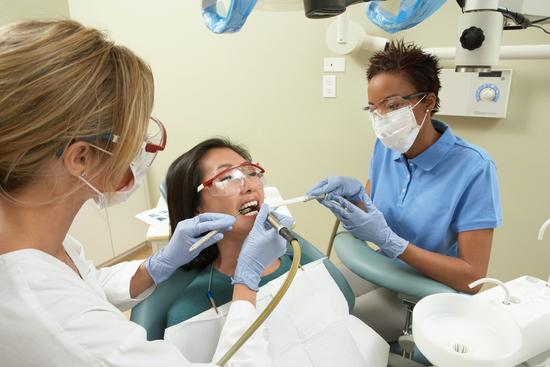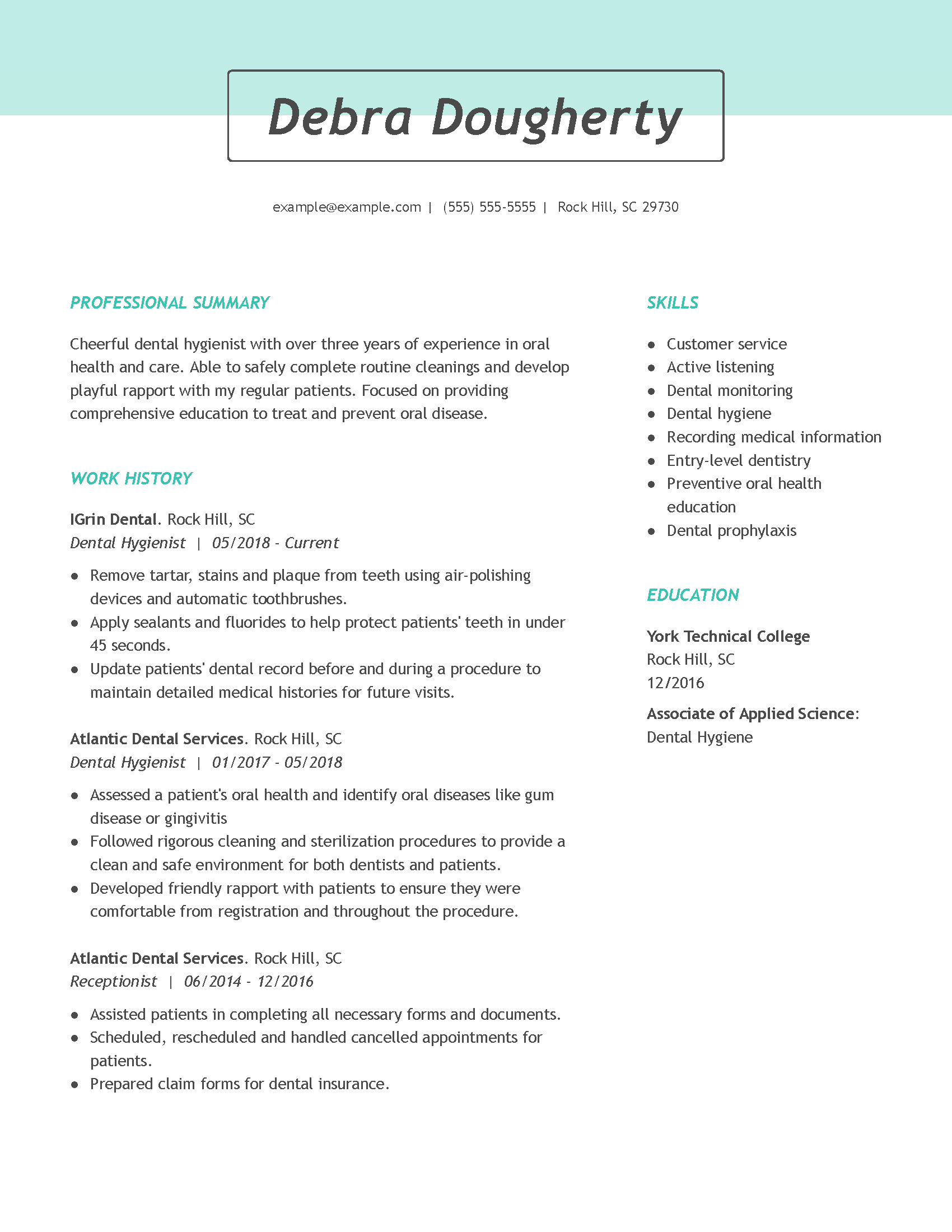Our customers have been hired at: *Foot Note
When interviewing for a dental assistant role, it's essential to prepare for questions that assess both your technical knowledge and your ability to provide excellent patient care.
In this guide, we'll delve into common dental assistant interview questions and answers, offering professional insights to help you present your qualifications confidently and succinctly.
Follow our tips and examples to boost your chances of securing your dream job. Use our Resume Builder to perfect your job application and get hired faster.
Make a resume with MyPerfectResume
Our Resume builder can help you write the perfect resume. Start Now!
Dentistry resume and cover letter examples to win more interviews
With our Resume Builder and Cover Letter Generator, you can quickly and easily build a dental assistant job application that impresses hiring managers.
Use the professionally crafted samples below to start building your resume and cover letter or to optimize existing ones.
Dental assistant resume
Dental assistant cover letter
Explore additional dental assistant resume examples and dental hygienist cover letter examples for tips and guidance from Certified Professional Resume Writers.
Common dental assistant interview questions
Tell me about yourself.
When answering this question remember to highlight the skills and experiences that make you an essential member of the dental team. To address this “ice breaker” interview question we recommend:
Structure your information: Organize your answer! By structuring your ideas you present your information in a clear and concise manner, thus enhancing your chances of impressing the interviewer.
- Begin with the present. Describe your current role, skills and experience.
- Emphasize your previous work and how it relates to the job you are interested in.
- Finish with the future. Showcase how your background can contribute to the role.
Emphasize your skills and expertise: Focus on the specific skills learned from your experience that make you a strong fit for the role. Highlight proficiency in areas such as patient preparation, equipment management and sterilization, X-rays and dental assisting procedures among others.
Show your achievements: Interviewers want to learn about any notable accomplishments or projects you have completed that demonstrate your skills and expertise. Add metrics that can help them understand how you have contributed to the success of previous organizations.
Highlight your personality: Feature your personality but keep it professional. Use techniques such as storytelling or share relevant professional anecdotes. Focus on traits that relate to the job you're applying for and the company's values.
Showcase your enthusiasm and commitment: Convey your genuine passion for working as a dental assistant and your eagerness to contribute to the organization's success.
Keep it short: Provide a brief, concise answer that highlights your professional experience and qualifications. Just like an elevator pitch technique, you should aim to keep your response to no more than 1-2 minutes, as going on too long can make you appear unfocused or unprepared.
Example Answer:
“With five years of experience as a dental assistant, my passion for providing quality oral healthcare drives me in this field. I have a strong understanding of dental procedures, equipment and patient software programs. Building solid connections with over 500 patients, I ensure they receive compassionate care, comfort and safety, resulting in a 98% patient satisfaction rate. I take pride in creating a positive and welcoming environment, and I am excited to contribute to the excellent patient care at your dental practice.”
Example Answer:
“When I first started my dental assisting career, I had the opportunity to assist a dentist during complex oral surgery. Despite feeling nervous, I remained focused and attentive, ensuring the dentist had all the necessary tools and instruments. This experience not only strengthened my technical skills but also instilled in me a deep sense of commitment to providing exceptional patient care.
Over the next three years, I assisted in over 250 dental procedures, consistently maintaining a 100% sterilization rate and earning praise from both patients and colleagues for my compassionate approach and attention to detail.”
Why do you want to work as a dental assistant?
Interviewers want to know that you are truly passionate about dentistry and that you have a genuine interest in helping patients with their oral health care needs.
Hiring managers are looking for examples of your work history and evidence that you have a clear understanding of dental procedures, equipment and patient software programs.
Additionally, they want to know that you are empathetic and compassionate and that you prioritize patient comfort and safety.
Even if you are a dental assistant with no experience this is a great opportunity to showcase your transferable skills and achievements. You can support your answer with examples.
Remember to finish with enthusiasm by talking about your long-term career aspirations in the field of dentistry, your career journey and how you can contribute to your new role.
Here are some tips to structure your answer to this question:
- Express your interest in the company and role.
- Discuss your relevant skills.
- Talk about your passion for the organization.
- Highlight your desire to contribute to this new role.
- End by expressing your excitement.
Example Answer:
“Having personally experienced the impact of dental care on my life, I am driven to work in your clinic as a dental assistant to help others improve their oral health and overall well-being. I am enthusiastic about being part of a team that provides compassionate care and ensures patient comfort during dental procedures. Additionally, I am eager to contribute my experience, learn and grow in the dental field, expanding my knowledge and skills to make a positive difference in people's lives.”
What are your key strengths and weaknesses?
One of the most frequently asked interview questions concerns your strengths and weaknesses, which are often considered the most daunting.
These questions are designed to help the interviewer get to know you better as a candidate. They enable the hiring manager to gain valuable insights into your personality, character and abilities.
Below are some examples of how to address this question.
Strengths:
It is important to focus on your strengths first, use keywords and highlight your top areas that make you a strong candidate.
This is a great opportunity to showcase your transferable skills and how you can apply them to the desired role!
Make sure to provide specific examples and achievements including metrics to support your strengths.
Example Answer:
“As a dental assistant, I have excellent communication, interpersonal and organizational skills. I can explain complex dental procedures to patients clearly and compassionately, collaborate with the dental team for efficient patient care, and effectively manage sterilization, record-keeping and appointment scheduling. This has resulted in a 20% reduction in instrument turnaround time, a 95% accuracy rate in record-keeping and a 15% increase in overall patient satisfaction.”
Weaknesses:
When discussing your weaknesses interviewers are interested in your level of self-awareness and your ability to recognize areas that need improvement.
They want to gain insight into how you handle challenges and how you actively work towards overcoming your weaknesses.
To answer this question, choose one or two areas for improvement that are not crucial to your desired job and explain how you are actively addressing them through personal development.
Always conclude on a positive note by emphasizing your dedication to self-improvement.
Example Answer:
“One area I've been working on is my tendency to take on too many tasks at once. While my enthusiasm for every aspect of the practice keeps me engaged and helps me learn, it can often lead to feeling overwhelmed. I have a habit of wanting to be involved in every aspect of the practice, from assisting the dentist to managing patient records and even handling some administrative duties.
To tackle this, I have been learning to delegate more effectively and trust my colleagues with responsibilities not immediately pressing for me. Additionally, I have been practicing better time management by setting clear priorities and creating a more structured workflow for my day. These skills have helped me become more efficient, less stressed, and have improved teamwork within the practice.”
Technical dental assistant interview questions
What dental software are you familiar with?
Hiring managers are looking to assess your technical skills and experience with different dental software programs.
You can provide a straightforward response by mentioning training, education or specific dental software experience.
You can use and provide examples of your proficiency like your ability to manage patient records or schedule appointments.
Here's an example of how you could answer:
Example Answer:
"I have experience working with several dental software programs throughout my career. These include Dentrix, Eaglesoft, Open Dental and SoftDent. I am proficient in navigating these software systems, scheduling appointments, managing patient records, and processing insurance claims. Additionally, I am always eager to learn and adapt to new software programs as needed.”
Are you familiar with dental insurance billing and coding?
As a dental assistant, your responsibilities can vary depending on the dental practice and state regulations.
You can combine both administrative and dentistry tasks to ensure the smooth operation of the dental practice. This is a great opportunity to showcase your healthcare skills.
When interviewers ask this question, they are looking to assess your knowledge and experience in handling the administrative and financial aspects of dental procedures.
This is an important topic because dental insurance billing and coding are critical aspects of dental office operations.
Here are some tips to answer this question:
- Highlight your experience.
- Discuss your training.
- Show your understanding.
- Talk about patient communication.
- Be honest.
Example Answer:
“Yes, I have experience with dental insurance billing and coding. In my previous role as a dental assistant, I handled insurance claims and used dental codes like CDT codes for accurate documentation. I verified patient insurance coverage, explained benefits, and utilized electronic billing systems like Dentrix and Eaglesoft to submit claims and track payments. I prioritize staying updated on dental insurance policies and regulations to ensure precise billing and coding.”
How do you implement infection control measures?
Infection control methods are critical to ensuring the safety of patients and staff. Establish your expertise in following proper protocols and minimizing the risk of cross-contamination and transmission of infectious diseases.
When answering this question remember to highlight your knowledge on:
- Patient safety
- Staff protection
- Compliance with regulations
- Prevention of the spreading of infectious diseases
- Professionalism and trust
Example Answer:
“As a dental assistant one way to implement infection control measures is by properly sterilizing and disinfecting all instruments and surfaces before and after patient use. This includes using an autoclave or chemical disinfectant to sterilize reusable instruments and wiping down surfaces with a disinfectant solution.
Additionally, wearing personal protective equipment (PPE), such as gloves and masks, and following proper hand hygiene protocols are crucial steps in preventing the spread of infectious diseases. Regularly monitoring and updating infection control protocols, as well as educating patients on proper oral hygiene practices, are also essential measures for dental assistants to implement.”
Behavioral dental assistant interview questions
How do you prioritize tasks during busy periods?
Interviewers want to assess how you prioritize tasks during busy periods to understand your organizational and time management skills.
The dental industry is a fast-paced environment where you’ll be required to juggle multiple tasks, such as assisting the dentist, preparing patients and managing administrative tasks.
It is essential to prioritize your tasks effectively to ensure that they are completed efficiently and in a timely manner.
By asking this question, interviewers can assess your ability to manage your workload during busy periods and ensure that you can work effectively under pressure.
Example Answer:
“During busy periods, it is important to prioritize tasks by assessing their urgency and importance. One strategy I use is creating a to-do list and identifying immediate tasks versus those that can wait. Prioritization should focus on urgent patient care needs over administrative tasks. Delegating tasks to team members and maintaining effective communication is also crucial. Being adaptable and flexible to handle unexpected changes or emergencies is key.”
How do you maintain patient confidentiality?
Maintaining patient confidentiality is essential to building trust and maintaining a strong doctor-patient relationship.
Patients need to know that their personal information is kept private, and they can speak freely and honestly with their dental assistants without the fear of being judged or having their information disclosed to others.
When discussing with the interviewer how you maintain patient confidentiality emphasize your knowledge on:
- The importance of confidentiality
- Adherence to policies and procedures
- Privacy during interactions
- Maintaining electronic security
Example Answer:
"I am well-versed in HIPAA regulations and understand the importance of protecting patient information. In my previous role, I consistently followed all policies and procedures related to patient confidentiality. I ensured that patient records were securely stored, accessed only by authorized personnel, and transmitted using encrypted methods.”
How do you ensure patient comfort and build rapport with them during dental procedures?
Dental procedures can cause anxiety and stress for many patients. By prioritizing patient comfort and building rapport, you can help reduce these negative feelings and make the experience more pleasant for the patient.
When interviewers ask this question, they want to evaluate if you recognize the significance of providing quality patient care.
Additionally, your answer provides insight into your communication skills and empathy toward patients, which are vital qualities in the dental profession.
Example Answer:
"I understand that patient comfort and building rapport are fundamental aspects of successful dental procedures. It is crucial to make the patient feel comfortable and relaxed during the procedure to reduce anxiety and stress. Building rapport also helps establish trust between the patient and the dental team, making it easier to communicate and understand the patient's needs."
Situational dental assistant interview questions
What steps do you take to get a patient ready for a dental procedure?
Interviewers want to know about your ability to prepare patients for their dental treatments.
They are looking for candidates who can efficiently and effectively guide patients through the process, ensuring their comfort and understanding of what to expect.
You can mention your proficiency in the following steps:
- Greeting the patient warmly
- Reviewing the patients’ dental history
- Explaining procedures
- Preparing the patient
- Offering distractions
- Providing post-procedure instructions
Example Answer:
“Preparation is one of the most important elements in the success of dental practices. As a dental assistant, my top priority is ensuring patients' comfort and readiness for dental procedures. I greet them warmly, review their dental history, and address any concerns or questions they may have. I assist them in getting comfortable in the dental chair, provide distractions, and help administer anesthesia if needed.
After the procedure, I provide instructions. My goal is to guide patients through the process efficiently, prioritize their comfort, and ensure a positive and stress-free dental experience.”
How do you work with patients who are anxious?
With this question, interviewers are looking for specific information on your approach, techniques, and strategies for helping patients feel more comfortable.
They want to know about your interpersonal skills, if you have empathy, communication skills and the ability to create a calming environment.
Interviewers also want to gauge if you understand the importance of individualized care and if you can adapt your approach to meet the unique needs of anxious patients.
Overall, they want to ensure that you have the skills and mindset to provide excellent patient care, especially when dealing with anxiety.
Highlight your ability to:
- Establish trust.
- Communicate with your patients.
- Create a calming environment.
- Use distraction techniques.
- Show empathy.
- Acknowledge their anxiety.
- Provide breaks.
Example Answer:
“To help patients feel at ease, I provide individualized care by greeting them warmly, addressing their concerns, and explaining the procedure in non-technical language. During the procedure, I offer distractions such as music or TV, provide reassurance, and adjust the process if needed. My goal is to create a calm and reassuring environment, make patients feel comfortable and supported, and ensure a positive and stress-free dental experience.”
How do you handle dental emergencies?
When responding to this question, hiring managers are evaluating your proficiency, expertise, and background in handling urgent dental situations.
Interviewers want to know if you can remain calm and focused in high-pressure situations and if you have the expertise to provide appropriate care.
Hiring managers also want to evaluate your soft skills, such as critical thinking and problem-solving abilities, and your communication skills with patients, colleagues and other health care professionals during emergencies.
They want to ensure you understand the importance of timely and efficient emergency management and have experience working with emergency protocols and procedures.
Your answer should include your ability to:
- Stay calm.
- Assess the situation.
- Provide immediate relief.
- Contact a dentist.
- Provide first aid.
- Offer comfort and reassurance.
Example Answer:
“I understand the importance of being prepared to handle dental emergencies effectively, which involves remaining calm, assessing the situation, and providing immediate relief. If necessary, I seek guidance from dental professionals and offer first aid while arranging for an emergency appointment. I communicate effectively with patients, colleagues, and other health care professionals to ensure timely and efficient emergency management, with a focus on providing immediate relief, seeking guidance and effective communication."
Tips for answering dental assistant interview questions
Research the company.
Research is essential for your application and interview process. Here are some tips to follow to effectively research the company:
- Visit the company website: Start by visiting the company website to learn more about their products or services, mission, values and culture. Look for information about their history, leadership team and recent news or press releases.
- Check their social media: Many companies have active social media accounts that can give you insights into their brand and culture, as well as any recent events or initiatives they are involved in.
- Use search engines: Conduct a Google search to find any information about the company that might not be available on their website or social media accounts. Look for news articles, reviews and any other information that might be relevant to your research.
- Take a look at company reviews: Check online reviews from current and former employees. This can give you insights into the company's culture, work-life balance, and overall employee satisfaction.
- Research the industry: Research the industry the company operates in to understand trends, challenges and opportunities. This can help you understand the company's position within the industry and how it compares to its competitors.
Practice your answers.
By practicing your answers, you can ensure that you clearly articulate your skills, experiences and achievements in a concise and effective manner.
Practicing also helps to reduce nervousness and anxiety, allowing you to present yourself with more confidence and poise during the interview.
Additionally, practicing can help you identify any potential gaps or weaknesses in your responses, giving you the opportunity to make adjustments and improve your chances of success.
Overall, practicing your answers beforehand can enhance your performance, increase your confidence and improve your chances of landing the job.
Highlight relevant experience and skills.
When hiring managers ask you to emphasize your relevant experience and skills, they are seeking to ensure that you possess the necessary qualifications and experience for the position.
They aim to evaluate how your skills align with the job requirements and how you can add value to the company.
To showcase relevant experience and skills during an interview, it is crucial to review the job description, incorporate keywords and prioritize your experiences and skills that align with the job requirements.
Additionally, they want to assess your ability to communicate effectively, highlight your strengths and relate your experiences to the company's needs.
Providing specific examples with quantifiable outcomes of how your experiences, core competencies and skills have prepared you for the role is also essential.
Key takeaways
- Take the time to thoroughly understand the responsibilities and requirements of the position.
- Research the company and incorporate this knowledge into our answers to show your interest and alignment with the organization.
- Structure your information to present clear and concise answers.
- Practice and preparation are crucial to get confidence in your interviews.
- Showcase your enthusiasm and commitment.
- Take the interview process as an opportunity to show your professional brand and personality.
Our customers have been hired at:*Foot Note









